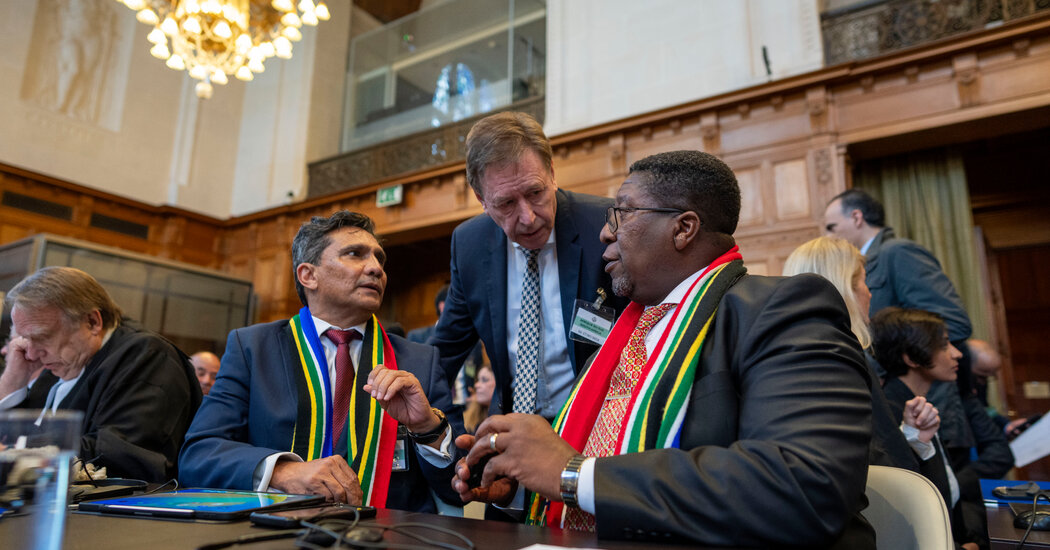
South Africa on Thursday urged U.N. Supreme Court judges to order Israel to end its ground attack on Rafah in southern Gaza, saying this would put Palestinian life in the enclave at imminent risk of destruction.
The hearing at the International Court of Justice in The Hague came after South Africa asked the court last week to impose further restrictions on Israel in its military campaign in Gaza. In documents released by the court, South Africa cited the “irreparable damage” caused by Israel's incursion into Rafah, Gaza's southernmost city, where half the territory's population had sought refuge.
“It has become increasingly clear that Israel's actions in Rafah are part of the end game in which Gaza will be completely destroyed as an area capable of hosting human settlements,” Vaughan Lowe, a British lawyer, told the court. “This is the last step towards the destruction of Gaza and its Palestinian people.”
Mr Lowe was part of the South African legal team that presented the case for two hours on Thursday.
The South African documents say the rights of Palestinians in Gaza are under threat, adding that Israel's control of two major border crossings in southern Gaza – in Rafah and Kerem Shalom – places the flow of humanitarian supplies into Gaza at extreme risk and hospital capacity. there to work.
“It's hard to imagine that a situation like this could get worse, but unfortunately it does,” John Dugard, another member of the South African team, told the court.
Several members of the team have addressed the court in an attempt to make their case, often citing warnings from senior United Nations officials that an assault on Rafah would worsen civilian conditions and the enclave's food crisis.
A member of the South African legal team, Tembeka Ngcukaitobi, cited statements by senior Israeli officials that he said show an intent to destroy Gaza as a whole and not simply Hamas, the country's avowed enemy.
The legal team also asked the court to order Israel to facilitate access to Gaza for aid workers, investigators, fact-finding missions and journalists.
One of the lawyers, Adila Hassim, showed the court a photo of destroyed buildings in Khan Younis, a town north of Rafah, to illustrate the devastation caused by the Israeli army in Gaza as a whole. Ms. Hassim looked like she was on the verge of tears as she described the deaths of children during the military campaign.
Israel has vehemently denied South Africa's claims, reiterating that it has placed no restrictions on the amount of aid entering the enclave and has recently taken measures to increase the amount of food and other supplies entering, including opening two crossings border in the north of the country. Gaza.
Israel also said its latest assault on eastern Rafah was a “precise operation” that targeted only members of Hamas, the terrorist group that led the October 7 attacks, which Israeli authorities say killed more of 1,200 Israelis and led to the capture of approximately 250 others.
Israel is expected to present its defense in court on Friday. Gilad Noam, Israel's deputy attorney general for international law, is among the officials in the Israeli delegation expected to speak to the court. It is unclear when the court will issue a decision, but given that South Africa said on Thursday that its petition was extremely urgent because an attack is underway in Rafah, it seemed possible that a ruling could come soon.
The hearings are part of South Africa's case accusing Israel of genocide, filed in December. In late January, the court ordered Israel to do more to prevent acts of genocide, but stopped short of calling for a ceasefire. The main case, which involves genocide charges, is not expected to begin until next year.
The Court, established by the United Nations Charter in 1945, was created to resolve disputes between member states. It has no means to enforce its orders, but South Africa's case has contributed to international pressure on Israel to curb its campaign in Gaza.
Marlise Simons AND Johnatan Reiss contributed to the reporting.
